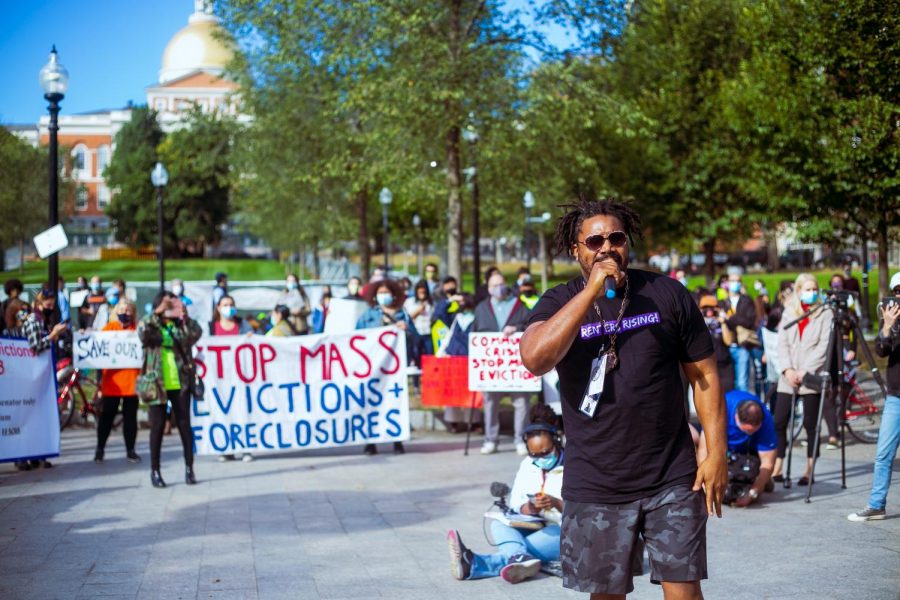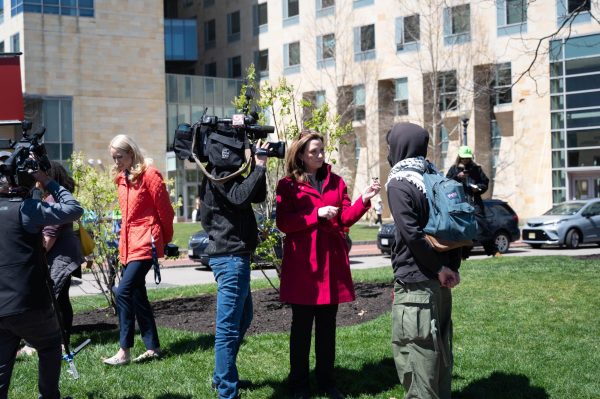‘Avalanche’ of evictions expected upon expiration of state moratorium
Protestors rally in Boston Common to gather support for the Housing Stability Act.
October 22, 2020
With the upcoming expiration of the state eviction moratorium, thousands of Massachusetts residents will lose the ability to shelter in place as they face impending risk of eviction and foreclosure.
Activists, state legislators and community members have been urging Gov. Charlie Baker to pass the COVID-19 Housing Stability Act, which would extend and expand the moratorium for a full year after the COVID-19 State of Emergency ends and establish a fund to help smaller landlords and working class homeowners. The moratorium was initially set to end on Aug. 18, but was extended due to the state’s historic unemployment numbers.
The response to the legislation, filed by Rep. Mike Connolly and Rep. and Housing Chair Kevin Honan, was largely favorable, passing through the housing committee last week with 87 co-sponsors.
However, negotiations ultimately fell flat — an outcome many landlords saw as a victory.
“This [was] absolutely an emergency,” Helen Matthews, communications director at the grassroots housing justice organization, City Life/Vida Urbana. “[Now] we expect an avalanche of households being pushed into the eviction machine.”
Skip Schloming, a property manager in Somerville and Cambridge and executive director of Small Property Owners Association, or SPOA, said they believed the bill would be a “disaster.”
“We utterly oppose it,” Schloming said last week before its expiration. “That is one of the most reckless things you could possibly propose, unless your agenda is to drive small property owners out and have the government take over all the housing.”
COVID-19 cases are on the rise, and unemployment rates are hovering at 16 percent. The Metropolitan Area of Planning Council, or MAPC, estimates 35 percent of those claimants are renters who will be expected to make outstanding rent payments when the state’s eviction moratorium ends. Although he did not move to pass the act, Baker announced a $171 million initiative to support those landlords and tenants as they deal with continued economic stress.
MAPC used unemployment claims from each municipality across the state to simulate the number of households that need rental or mortgage assistance during the pandemic. Research revealed a jarring prediction that more than 100,000 households across the state will be unable to pay upcoming rent or mortgage due to layoffs, leaving them at risk of eviction and foreclosure.
Additionally, one in six renters are already behind on rent payments and one in five are not confident in their ability to pay October rent, said research analyst Sarah Philbrick of MAPC.
Those who were spending a large portion of their income on basic needs have been particularly vulnerable during the pandemic due to low wages or rising property prices. There are 45,000 rental households and 35,000 households across the state in which someone is receiving unemployment but is still unable to cover their basic needs.
Philbrick also notes that these numbers may be conservative as the research does not account for those who are underemployed, saw their housing prices raised, are collecting Pandemic Unemployment or couldn’t file for unemployment due to immigation status.
“Local municipalities don’t have this kind of money on hand. No one has a rainy day fund big enough to cover this crisis,” Philbrick said. “While part of the solution is having local and state governments provide more money for assistance, there are other important solutions like getting landlords and tenants to create negotiations or payment plans.”
Another solution Philbrick proposed is a right to counsel policy, which would guarantee that those who can’t afford a lawyer are represented if brought to court for eviction.
However, Matthews doesn’t believe these solutions will prevent evictions. She believes that altering the justice system to give everyone access to an attorney is necessary, but recognizes that many people flee their home as soon as they receive a notice.
“People feel overwhelmed. They feel afraid. They feel shame. They feel like it’s a losing battle, so they just up and leave,” Matthews said. “The power to displace people is often just in the form of the notice.”
Schloming said landlords are worried about paying their bills too.
“The situation becomes that there’s not enough money for you to pay your rent, your insurance, your taxes, and you have no choice but to walk away, abandon your property and the tenants are on their own to manage it themselves. That is exactly what is poised to happen,” Schloming said.
Schloming and other members of SPOA worked to block the extension of the state moratorium and are continuing to urge President Trump to end the federal moratorium.
“You gotta get people going. They’re in the situation right now where it’s like ‘Gee, I’m living rent free. Why would I do anything to change this situation?’” said Schloming. “The eviction moratorium has to end so that there is a credible threat that they will be evicted.”
Schloming says tenants need to be motivated to negotiate with their landlords. These negotiations, he says, happen every time a new rent cycle begins.
“We’re not expecting landlords to do anything differently,” he said. “We’re saying to end the eviction moratorium so that the tenants are motivated to the landlords.”
Matthews says these negotiations often don’t happen due to fraught tenant-landlord relationships.
“We also have had many people call our hotline who have been threatened, harassed and intimidated by their landlord,” she said. City Life/Vida Urbana has two 24-hour phone hotlines, one in English and one in Spanish, that residents can call if they’re facing an eviction-related emergency.
Matthews believes funding for rental assistance needs to be paired with regulations on landlord behavior.
“If you bail people out without also regulating the behavior of landlords, especially big corporate landlords, the money just trickles up the housing food chain and those corporate landlords just continue to raise rent and evict people when they want to flip a property,” Matthews said. “There needs to be a combination of enough monetary aid distributed effectively with regulations on corporate actors who are, honestly, acting in their own self interests.”
Matthews said programs like Rent Assistance for Families in Transition, or RAFT, have been insufficient as well.
“People who have been waiting since the spring haven’t gotten a penny and probably won’t get a penny,” she said of RAFT. “There are language barriers and technology barriers to accessing that funding. And there’s just not enough funding in that pot in the first place. It’s not a silver bullet.”
Schloming rents to middle-class individuals and families, and while he hasn’t struggled to collect rent during the pandemic, he has a few vacant properties and expects that he will have to lower the rent of many of his listings next year. Schloming believes that federal and local eviction moratoriums are unsustainable for small landlords.
Housing advocates and community members are already taking to the streets to protest the expiration of the moratorium and to demand more support from the Massachusetts government. The federal moratorium, set by the CDC, is in place until the end of 2020, but does not offer the same protections proposed by the COVID-19 Housing Stability Act and leaves many low income homeowners and renters at risk of displacement.


















